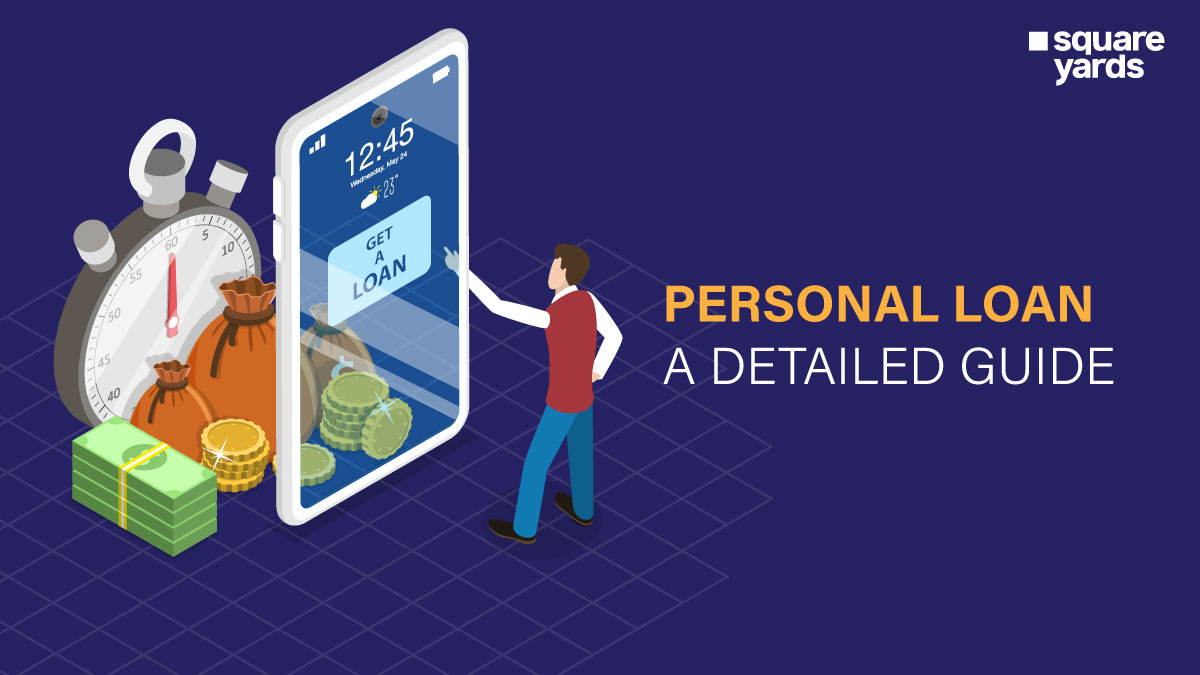A viable solution to swiftly address a financial crisis is certainly a personal loan. They are not only expedient, but offer great flexibility and accessibility. Moreover, a personal loan can be crucial for emergencies as well as for occasions like weddings, travel, and shopping, and it can be obtained without need for collateral. However, identifying the right time to take out a personal loan necessitates keen attention to the prevailing interest rate trends. For instance, current interest rates swing between 7% to 31%, with the most attractive rates being provided by Punjab National Bank. Furthermore, it is advisable to keep an eye on the associated loan processing fees.
What is a Personal Loan?
A personal loan, provided by a lending institution such as a bank or online lender, serves as a financial aid to improve one’s economic status by lending money to the borrower at a cost. This financial assistance can be employed for various purposes, including clearing previous arrears, financing weddings or higher education, home refurbishments, or travel. Multiple lenders like banks, digital lenders, and non-financial banking institutions offer personal loans. The borrower is required to repay the borrowed sum over a period through equal monthly installments.
Generally, no collateral is needed for personal loans. Moreover, the interest rates, qualifying requirements, and loan amounts differ among several lenders. The duration of loan repayment is pre-negotiated, with set monthly repayment capabilities determined by the borrower.
How Does a Personal Loan Work?
Understanding personal loans is relatively straightforward — they’re essentially a type of borrowing. When financial needs pop up, banks can step in and provide some relief, lending money in return for interest, even if your regular income isn’t substantial. A specific total is transferred to your bank account as the personal loan. Repayment then gets made over a certain timeframe at a set interest rate for that duration. The repayment term can range anywhere between a year to a decade, and banks generally offer personal loans in two different ways.
The first method is a secure one that involves collateral. Here, in the event of a borrower defaulting, the banks can confiscate the collateralized asset as a form of repayment.
Contrarily, unsecured loans carry no such obligation. If repayments aren’t made, banks have no asset to claim, but your credit score could take a significant hit. This situation could lead to high-interest rates, limited lending, or, in the worst cases, outright rejection of loan applications. Lenders might even resort to court proceedings to recoup the money owed, together with the interest and fees of the personal loan.
There’s also another form of personal loan called a line of credit. This entails a predetermined credit limit, also known as an unsecured revolving personal line of credit. Its interest rate fluctuates depending on the current market rate. As a borrower, you’d repay both the withdrawn credit and the charged interest.
Purpose Of A Personal Loan
There are a multitude of reasons why someone might need a personal loan. Let’s delve into how personal loan finance can come in handy.
Home Remodeling
When considering a swift home makeover, a personal loan can be more beneficial than a home loan, primarily because it usually doesn’t require the pledge of collateral and provides competitive interest rates. Given that home renovations can be pricey, shorter personal loan tenures can relieve the burden of assuming a hefty home loan.
Dealing with a Medical Crisis
Medical emergencies requiring instant financial aid can be suitably addressed with a personal loan, which is processed, sanctioned, and disbursed swiftly with minimal paperwork. Hence, it can conveniently cater to your urgent medical expenses.
Educational and Tuition Expenses
A personal loan is an excellent tool to finance your education. Whether you wish to pursue studies domestically or abroad, a personal loan can cover all the necessary expenses- right from tuition to living costs.
Enhancing Credit Ratings
Paying off old debts with a personal loan can start a fresh payment cycle, reflecting positively on your CIBIL score. Since EMIs for the principal amount are tailored according to your capacity to repay and carry relatively low-interest rates, they can be paid off promptly, thereby boosting your credit score.
Wedding Expenditures
A wedding is a once-in-a-lifetime event, and the aspiration to make it grand and extravagant is typical. Personal loans can enable self-sufficiency, facilitating these aspirations without draining your savings. Be it booking the venue, shopping, or planning an overseas honeymoon, a personal loan can help you smoothly finance the entire event.
Achieving Dream Vacation
Personal loans are handy not just in times of need but also to fulfill your aspiration for a dream holiday. As a swift, flexible, and easy-to-repay financial product, you can avail a personal loan online
Benefits and Features of a Personal Loan
Absolutely, personal loans come with diverse benefits that can be capitalized upon to meet a variety of monetary goals. Some of these advantages and characteristics include:
Flexible Repayment Duration: Personal loans provide repayment terms that are adjustable to your suitability. You can select the loan tenure that best fits your budgetary needs and timeline.
Stable Interest Rate: Personal loans offer affordable interest rates and types, including fixed and variable. A fixed interest rate is generally the safer option, since it isn’t prone to market volatility. Just keep in mind to opt for this type when rates in the market are lower to ensure manageable EMIs and eliminate the stress of punctual repayment or financial shortages.
Collateral-free: Being unsecured, personal loans do not require you to pledge a collateral. This eliminates the need to risk valuable assets, making it an attractive option for borrowers.
Swift Disbursal: One of the appealing attributes of personal loans is the quick disbursement into the borrower’s account. This makes it a suitable choice to meet pressing financial or medical emergencies.
Simple Eligibility Criteria: The eligibility requirements for personal loans are fairly straightforward. Lending requires you to be an Indian citizen aged between 21 to 65 years with a good credit score. Even with lower scores, personal loans may still be approved, although with higher interest rates and reduced principal amounts.
Minimal Paperwork: Minimal documentation is required to obtain a personal loan, making it more accessible for borrowers. This typically includes proof of identity, address, income, passport-sized photographs, and a credit report.
Financing up to ₹25 Lakhs: A personal loan can offer financing up to ₹25 lakhs to cater to your current and prospective personal financial needs, once you fulfill the eligibility criteria.
Unrestricted Usage: Perhaps one of the greatest advantages of a personal loan is the freedom to utilize the funds as desired. There’s no stringent rule dictating how the disbursed funds should be used, offering borrowers greater financial flexibility.
Eligibility Criteria For Securing a Personal Loan
Yes, there indeed are some prerequisites that must be met prior to applying for a personal loan. These parameters help in determining whether one qualifies for personal loan finance. Although these eligibility requirements essentially give the banks an idea about how much they can lend, it is vital to meet these to avoid rejection. Here are some key factors to consider:
Age Requirement: The applicant should fall within the age bracket of 21 to 68 years.
Income Source: The applicant must have a reliable source of income. This implies that the applicant could be a salaried individual, self-employed, or an entrepreneur.
Employment History: The applicant should have a work experience of at least 2 years.
Minimum Income: The applicant should have a minimum income of INR 5000 per month.
Good Credit Score: A crucial deciding factor is the applicant’s CIBIL score which should ideally be 750 or more.
Personal Loan Finance Duration
Indeed, the tenure is a critical consideration when applying for a personal loan. Strategic financial planning remains paramount regardless of the size of expenses involved. When it comes to loans, the length of the loan period can considerably influence the cost in terms of interest payments. The tenure impacts both the borrower and the lender. For the latter, they may be more willing to offer a lengthy duration to younger applicants, compared to older ones, given the repayment timeline.
From the borrower’s perspective, the loan duration directly influences the total interest payment and the size of the monthly installments. For example, choosing a longer tenure means you’ll pay more in interest over the life of the loan due to the extended repayment period, even though the monthly installments might be smaller and perhaps more manageable. On the contrary, a shorter loan term means less total interest paid, as the repayment time is shorter. However, this also translates into higher monthly installments. Hence, it’s important to consider your financial capacity and goals when selecting the loan tenure.
From Which Bank/Financial Institution Should One Borrow?
When applying for loans, it is always imperative to conduct thorough research on banks offering the lowest interest rates at the time.
To avoid overburdening yourself with large EMIs, you should ensure that you make modest principal repayments annually or quarterly, depending upon your payout capabilities.
Here are some of the top banks or financial institutions which can be considered for availing personal loans.
| Financial Institutions |
Interest Rates |
| SBI |
9.80 % to 13.80 % |
| IDFC First Bank |
10.49 % to 25 % |
| Tata Capital |
10.99 % |
| Axis Bank |
10.25 % |
| IndusInd Bank |
10.49 % |
| ICICI Bank |
10.50 % |
| Bajaj Finserv |
13.00 % |
| Kotak Mahindra Bank |
10.99 % |
| HDFC Bank |
10.50 % to 21 % |
Can I Apply Jointly with my Spouse?
Certainly, having a co-applicant is an option when applying for a loan. In such instances, the credit scores of both applicants are taken into consideration. If the loan is defaulted, it adversely impacts the credit scores of both co-applicants, as they share the responsibility of loan repayment. A co-applicant can be your spouse, parent, siblings, and so on.
Documents Required for a Personal Loan
While the requisite documents for personal loan finance applications are usually minimal, it’s an essential step in the process. However, there are several methods to apply for a loan without any documentation, which includes being a long-standing customer of a bank, maintaining a high credit score, or securing a pre-approved loan.
The key documents required for personal loan finance are as follows:
For proof of identity, documents such as Aadhaar Card, PAN Card, Driver’s License, Voter’s ID, and so on, can be used.
For proof of residence, documents like Aadhaar Card, PAN Card, Driver’s License, Voter’s ID, utility bills, or any other Government issued identification can serve the purpose.
Details of bank accounts like passbook, canceled checks, and so on, are needed.
An employment salary slip is also required.
Balance Transfer Offer
A Balance Transfer Offer refers to the method where a remaining loan amount is settled using another bank loan that features a different interest rate. This can be a beneficial strategy for clearing the initial loan amount and securing a more advantageous interest rate. It allows one to clear any pre-existing debts with a personal loan. However, customers need to be cautious and understand the prepayment fee policies of different lenders. Typically, banks permit customers to switch their lenders a year before their term ends. A balance transfer offer also creates an opportunity for customers to obtain a lower interest rate.
Things to Avoid While Applying For a Personal Loan
When applying for a personal loan, there are certain pitfalls to avoid, as they can lead to significant savings and reduced recurring costs. One major factor to avoid is not properly evaluating your financial situation. This can lead to defaults, damaging your credit score and possibly resulting in legal disputes with lenders.
Excessive shopping around can also leave a negative impression with banks, potentially impacting creditworthiness. Concealing existing debts can lead to excessive monthly installment (EMI) costs, with even a single missed payment damaging your credit score. Always thoroughly review all terms and conditions, determining the appropriate loan duration. Lastly, always compare options from different lenders to ensure you’re getting the best deal.
Commonly asked questions about personal loans:
-
How long can a personal loan term be?
Loans can range from 48 to 60 months, or for some banks, up to 84 months.
-
What is a good interest rate for a personal loan?
Interest rates vary based on macroeconomic conditions. During inflationary periods rates are typically high, while during deflation they are lower. A good rate for your specific situation can depend on your CIBIL score (750+ is suggested).
-
Which banks offer personal loans easily?
You may receive pre-approved offers from your existing bank; online applications or official bank websites are other options. HDFC and ICICI banks are noted for quick approvals.
-
Who is eligible for a personal loan?
Individuals with a PAN Card, proof of residence, ID, salary slips, and who are 21 years or older.
-
How does a high credit score help?
A high credit score can facilitate loan approvals, as it suggests reliability. It can also result in lower interest rates, longer repayment periods, and higher loan amounts.
-
Are there risks associated with personal loans?
A missed payment can negatively impact your credit score, making future loans more difficult and possibly more expensive to secure.
-
Is a personal loan a good option?
Yes, a personal loan can provide quick access to funds. They are typically approved instantly, require no collateral, and can be disbursed quickly. Thus, personal loans can be highly beneficial financial tools.


